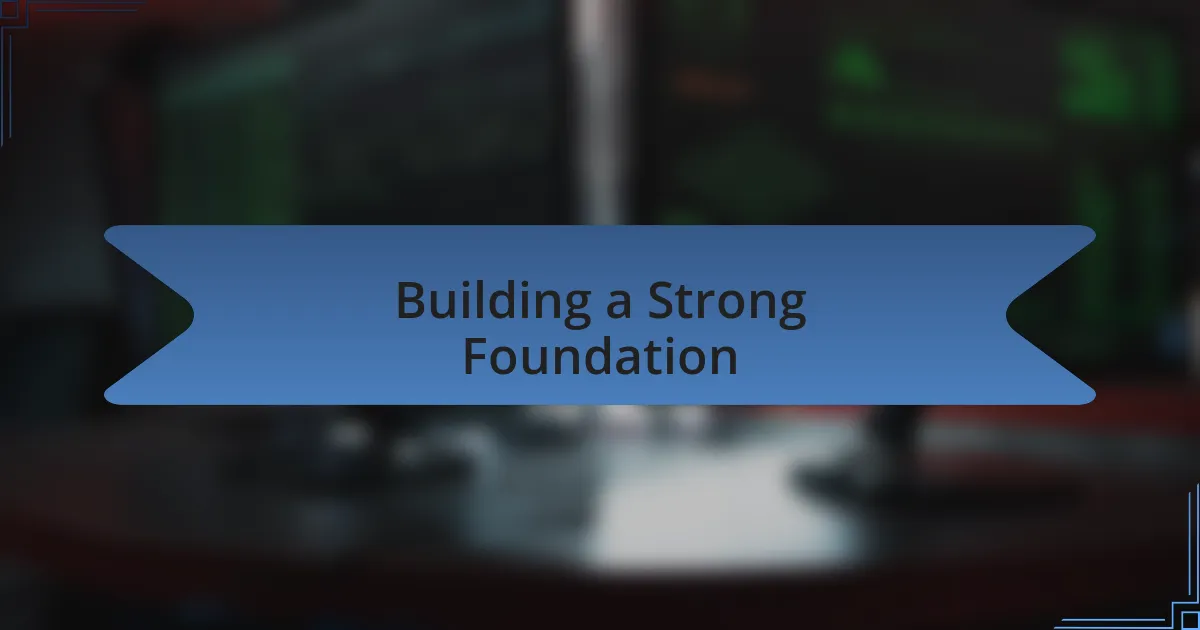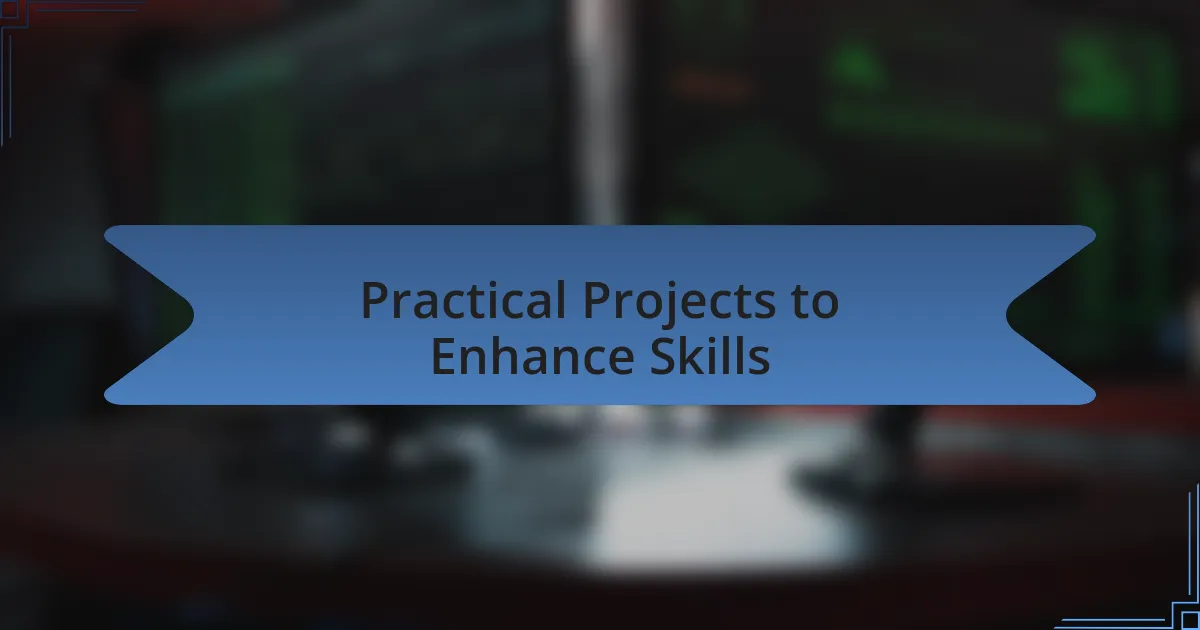Key takeaways:
- Understanding fundamental concepts like data types, control structures, and object-oriented programming is essential for beginners in C++.
- Engaging in practical projects, such as building games or applications, enhances programming skills and problem-solving abilities.
- Utilizing online resources, books, and developer communities can significantly support learning and help overcome challenges in C++.
- Reflecting on learning experiences and past mistakes fosters resilience and helps set future learning goals.

Understanding C++ for Beginners
Diving into C++ as a beginner can feel overwhelming, but it’s also an exciting journey. I remember the first time I opened my IDE, staring at that blank page. What do I even type? The key is to start with the simple stuff, like understanding data types and control structures. Have you ever felt lost in a sea of syntax? I know I did, but focusing on the basics helped me build a solid foundation.
Once I grasped variables and loops, something clicked. I could create small programs that actually did something! For example, I wrote a basic calculator that sparked my curiosity about functions. Why do certain actions require a function? It’s like organizing your toolbox; once I categorized my tools, I realized how much easier coding became. Have you tried breaking down a problem into smaller chunks? It’s a game-changer.
As I worked through C++ concepts, the community became my lifeline. I found helpful forums and met others who faced similar challenges. Seeing someone else tackle a problem successfully reignited my motivation. It’s like having a study group, isn’t it? Those moments of connection remind me that learning C++ is not just about mastering the language; it’s about growing alongside fellow developers.

Key Concepts in C++
Understanding key concepts in C++ is vital for any budding programmer. For instance, when I first encountered object-oriented programming (OOP), it was like unveiling a new layer of possibilities. I remember feeling both exhilarated and confused—how could simple objects interact to create complex behaviors? This approach allows you to model real-world scenarios, making your code more relatable and organized. Have you ever thought about how your favorite apps are structured? That’s the magic of OOP.
Templates in C++ were another revelation for me. The first time I wrote a template function, my mind raced with excitement. I realized that I could create functions that worked with any data type. It felt like opening a treasure chest of flexibility and power—suddenly, my code became reusable and efficient. Have you tried your hand at templates yet? There’s something satisfying about writing code that adapts seamlessly to different scenarios.
Then there was the concept of memory management, which initially scared me. The idea of pointers felt akin to navigating a maze without a map. However, as I delved deeper, I discovered the importance of dynamic memory allocation and how it affects program performance. Once I mastered it, that daunting maze transformed into a clear path, empowering me to write more efficient code. Has mastering memory management changed your perspective on coding? It truly reshaped mine.

Building a Strong Foundation
Building a strong foundation in C requires more than just grasping syntax; it involves truly understanding how the language operates at a fundamental level. I still remember the first time I tried to write a simple program that used loops and conditions—it felt like I was piecing together a puzzle where each piece had its unique place. This foundational grasp highlighted for me the power of control structures, and I often wonder how many budding programmers overlook this essential aspect in their rush to produce code.
Diving deep into data structures provided me with invaluable insights into how to efficiently manage and organize my data. I vividly recall struggling with linked lists, feeling overwhelmed until I started visualizing them as a chain of nodes. Suddenly, they made perfect sense! This experience taught me that visualizing concepts could unlock an entirely new understanding and I now often ask myself: how can breaking down complex ideas into visual components help simplify challenges in programming?
Learning about basic algorithms was another eye-opener. I distinctly remember the satisfaction of implementing a sorting function for the first time. It felt like I was adding a layer of intelligence to my code, allowing it to make decisions independently. Reflecting on that moment, I often wonder how algorithms shape our interaction with technology. Understanding these building blocks helped me see the bigger picture, and I encourage you to think about how mastering algorithms can elevate your programming capabilities.

Setting Up a C++ Environment
Setting up a C++ environment is a straightforward process, but it’s crucial to ensure every step is done correctly. When I first installed my C++ compiler, I remember staring at my screen, questioning if I’d selected the right settings. I found that taking the time to research the best compilers, like GCC or Visual Studio, made a world of difference; choosing the right tool created a smoother coding experience for me.
Once I settled on the compiler, the next step was configuring the IDE (Integrated Development Environment). I recall the thrill of customizing my workspace, adjusting themes, and setting up shortcuts that fit my workflow. It was enlightening to see how these small changes helped me focus better and boosted my productivity. Have you ever noticed how a comfortable, tailored environment can influence your coding flow?
Finally, ensuring that my build environment was on point was essential. I vividly remember facing a confusing error message that left me scratching my head. After some trial and error, I learned that setting up the right paths and libraries accurately resolved such issues. This experience taught me that a properly configured environment can save countless hours of frustration, allowing for creativity and exploration to flourish while coding.

Practical Projects to Enhance Skills
When it comes to enhancing my C++ skills, I found that working on practical projects, like building a simple game, was invaluable. I still remember the moment I successfully implemented a basic Tic-Tac-Toe game, and the sense of accomplishment that washed over me was incredible. Have you ever created something from scratch and felt a surge of pride? This project not only challenged my programming abilities but also taught me critical problem-solving skills that I carry with me today.
Another effective project that I undertook was developing a personal budgeting application. This was not just about coding; it was a chance to improve my understanding of data structures and algorithms. I vividly recall the trial-and-error moments when I had to debug my code—a true test of perseverance! Navigating those hurdles helped deepen my grasp of core concepts, ultimately empowering me to write cleaner, more efficient code.
Lastly, contributing to an open-source project was a game-changer for me. Engaging with a community of developers while working on real-world problems was both exhilarating and intimidating. I remember feeling that imposter syndrome creeping in as I navigated through someone else’s codebase. But each contribution not only enhanced my skills but also connected me with others who shared my passion. Has collaborating with others ever pushed you to advance more than you thought possible? For me, the answer was a resounding yes.

Resources for Learning C++
When I decided to enhance my C++ skills, I found online platforms to be incredibly helpful. Websites like Codecademy and Udacity provided structured courses that not only introduced me to the language but also offered interactive coding exercises. Have you ever felt that rush of excitement when you complete a module and finally grasp a complex concept? It felt like unlocking a new level in a game, and it motivated me to keep pushing forward.
Books can be another fantastic resource. “C++ Primer” by Lippman was my go-to guide for deepening my understanding. I appreciated how it balanced theory with practical examples. There were nights I spent curled up with this book, fully immersed, occasionally chuckling at the author’s witty explanations. It made the learning process not just informative but enjoyable – don’t you think that a good book can sometimes feel like a conversation with a wise friend?
Lastly, engaging with developer communities, such as Stack Overflow or Reddit’s r/cpp, played a critical role in my learning journey. Whenever I faced roadblocks, I sought advice and found answers from experienced programmers willing to share their knowledge. It was empowering to know I wasn’t alone in my struggles. Have you tapped into the wealth of wisdom available in online communities? It was through these interactions that I discovered not only solutions but also a collective passion for C++ that kept me inspired.

Reflecting on My Learning Journey
Reflecting on my learning journey, I realize how much each small victory meant to me. I remember one late night, I finally debugged a piece of code that had been haunting me for days. It felt like a weight had lifted off my shoulders. Have you ever experienced that moment of clarity after persistent struggle? Those instances transformed my challenges into stepping stones.
As I navigated through various projects, I often found myself revisiting old mistakes. Each bug I encountered became a lesson in resilience. I still recall the frustration of a segmentation fault that took me hours to resolve, but when I finally understood what went wrong, that “aha” moment was incredibly rewarding. Aren’t those the moments that cement our learning the most?
I’ve also learned the importance of setting milestones. After completing each project, I took the time to reflect on what I had achieved. This process of self-assessment not only boosted my confidence but also helped me identify areas for improvement. Have you considered how reflecting on your progress can shape your future learning goals? It turned out that these reflections were just as valuable as the coding itself.